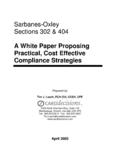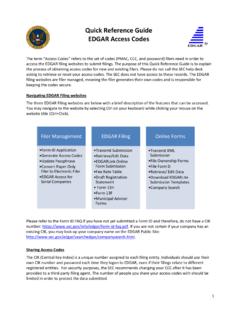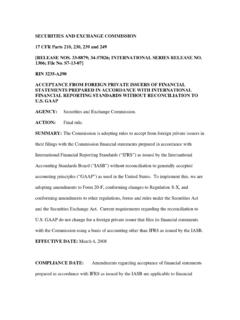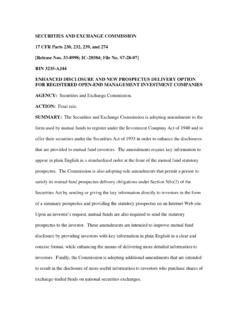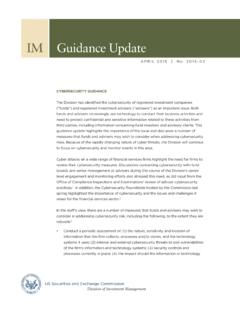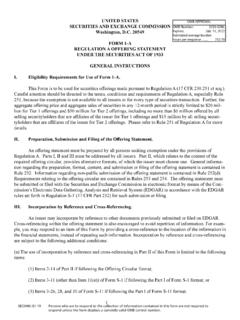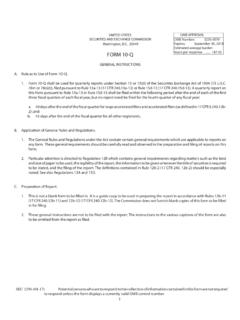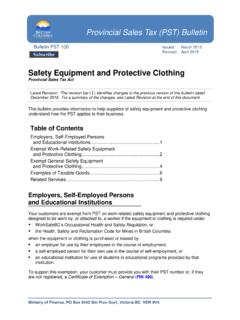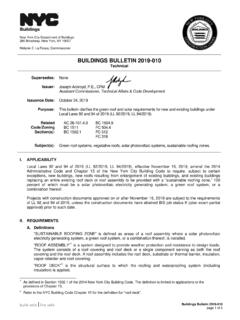Transcription of Investor Bulletin - SEC
1 Investor Bulletin : real estate investment Trusts (REITs) real estate investment trusts ( REITs ) have been around for more than fifty years. Congress established REITs in 1960 to allow individual investors to invest in large-scale, income-producing real estate . REITs provide a way for individual investors to earn a share of the income produced through commercial real estate ownership without actually having to go out and buy commercial real is a REIT?A REIT, generally, is a company that owns and typically operates income-producing real estate or real estate -related assets. The income-producing real estate assets owned by a REIT may include office buildings, shopping malls, apartments, hotels, resorts, self-storage facilities, warehouses, and mortgages or loans. Most REITs specialize in a single type of real estate for example, apartment communities.
2 There are retail REITs, office REITs, residential REITs, healthcare REITs, and industrial REITs, to name a few. What distinguishes REITs from other real estate companies is that a REIT must acquire and develop its real estate properties primarily to operate them as part of its own investment portfolio, as opposed to reselling those properties after they have been to Qualify as a REIT?To qualify as a REIT, a company must have the bulk of its assets and income connected to real estate investment and must distribute at least 90 percent of its taxable income to shareholders annually in the form of dividends. A company that qualifies as a REIT is allowed to deduct from its corporate taxable income all of the dividends that it pays out to its shareholders. Because of this special tax treatment, most REITs pay out at least 100 percent of their taxable income to their shareholders and, therefore, owe no corporate addition to paying out at least 90 percent of its taxable income annually in the form of shareholder dividends, a REIT must: Be an entity that would be taxable as a corporation but for its REIT status; Be managed by a board of directors or trustees; Have shares that are fully transferable; Have a minimum of 100 shareholders after its first year as a REIT; Have no more than 50 percent of its shares held by five or fewer individuals during the last half of the taxable year; Invest at least 75 percent of its total assets in real estate assets and cash.
3 Derive at least 75 percent of its gross income from real estate related sources, including rents from real property and interest on mortgages financing real property; Investor Assistance (800) 732-0330 Derive at least 95 percent of its gross income from such real estate sources and dividends or interest from any source; and Have no more than 25 percent of its assets consist of non-qualifying securities or stock in taxable REIT Categories of REITs: Equity, Mortgage, and HybridREITs generally fall into three categories: equity REITs, mortgage REITs, and hybrid REITs. Most REITs are equity REITs. Equity REITs typically own and operate income-producing real estate . Mortgage REITs, on the other hand, provide money to real estate owners and operators either directly in the form of mortgages or other types of real estate loans, or indirectly through the acquisition of mortgage-backed securities.
4 Mortgage REITs tend to be more leveraged (that is, they use a lot of borrowed capital) than equity REITs. In addition, many mortgage REITs manage their interest rate and credit risks through the use of derivatives and other hedging techniques. You should understand the risks of these strategies before deciding to invest in these types of REITs. Hybrid REITs generally are companies that use the investment strategies of both equity REITs and mortgage they often invest in debt securities secured by residential and commercial mortgages, mortgage REITs can be similar to certain investment companies that are focused on real estate . Generally, companies that invest a majority of their assets in real estate are exempted from the rules that govern investment companies, such as mutual funds. The SEC has initiated a review to determine whether certain mortgage REITs should continue to be exempt from investment company regulation.
5 Those rules generally limit the amount of leverage that a fund can use and regulate the fees that can be charged to of Publicly Traded REITs and Non-Traded REITsMany REITs (whether equity or mortgage) are registered with the SEC and are publicly traded on a stock exchange. These are known as publicly traded REITs. In addition, there are REITs that are registered with the SEC, but are not publicly traded. These are known as non-traded REITs (also known as non-exchange traded REITs). The table below compares the characteristics of publicly traded and non-traded PUBLICLY TRADED REITs NON-TRADED REITs Overview REITs that file reports with the SEC and whose shares trade on national stock exchanges. REITs that file reports with the SEC but whose shares do not trade on national stock exchanges. Liquidity Shares are listed and traded, like any publicly traded stock, on major stock exchanges.
6 Most are NYSE listed. Shares are not traded on public stock exchanges. Redemption programs for shares vary by company and are typically very limited. Investors may have to wait to receive a return of their capital until the company decides to engage in a transaction such as the listing of the shares on an exchange or a liquidation of the company s assets. Transaction Brokerage costs the same as Typically, fees of 9 - 10 percent of the PUBLICLY TRADED REITs NON-TRADED REITs Overview REITs that file reports with the REITs that file reports with the SEC but Costs for buying or selling any other publicly traded stock. investment are charged for broker-dealer commissions and other upfront offering costs. Ongoing acquisition and management fees and other expenses also are typical. Back-end fees may be charged. Management Typically, the managers are employees of the company.
7 Typically, the company has no employees and is managed by a third party pursuant to a management contract. Minimum investment Amount One share. Typically, $1,000 - $2,500. Independent Directors Stock exchange rules require a majority of directors to be independent of management. NYSE and NASDAQ rules call for fully independent audit, nominating, and compensation committees. North American Securities Administrators Association ( NASAA ) guidelines, which have been adopted by many states, require a majority of directors to be independent of management. NASAA guidelines also require that a majority of each board committee consist of independent directors. Investor Control Investors elect directors. Investors elect directors. Corporate Governance Specific stock exchange rules on corporate governance. Subject to state and NASAA guidelines.
8 Disclosure Obligation Required to make regular SEC disclosures, including quarterly financial reports and yearly audited financial reports. Required to make regular SEC disclosures, including quarterly financial reports and yearly audited financial reports. Share Value Transparency real -time market prices are publicly available. Wide range of analyst reports available to the public. No independent information about share value available. Company may provide an estimated share value 18 months after the offering has closed. 1 SEC and whose shares trade on national stock exchanges. whose shares do not trade on national stock exchanges. Liquidity Shares are listed and traded, like any publicly traded stock, on major stock exchanges. Most are NYSE listed. Shares are not traded on public stock exchanges. Redemption programs for shares vary by company and are typically very limited.
9 Investors may have to wait to receive a return of their capital until the company decides to engage in a transaction such as the listing of the shares on an exchange or a liquidation of the company s assets. Transaction Costs Brokerage costs the same as for buying or selling any other publicly traded stock. Typically, fees of 9 - 10 percent of the investment are charged for broker-dealer commissions and other upfront offering costs. Ongoing acquisition and management fees and other expenses also are typical. Back-end fees may be charged. Management Typically, the managers are employees of the company. Typically, the company has no employees and is managed by a third party pursuant to a management contract. Minimum investment Amount One share. Typically, $1,000 - $2,500. Independent Directors Stock exchange rules require a majority of directors to be independent of management.
10 NYSE and NASDAQ rules call for fully independent audit, nominating, and compensation committees. North American Securities Administrators Association ( NASAA ) guidelines, which have been adopted by many states, require a majority of directors to be independent of management. NASAA guidelines also require that a majority of each board committee consist of independent directors. Investor Control Investors elect directors. Investors elect directors. Corporate Governance Specific stock exchange rules on corporate governance. Subject to state and NASAA guidelines. Disclosure Obligation Required to make regular SEC disclosures, including quarterly financial reports and yearly audited financial reports. Required to make regular SEC disclosures, including quarterly financial reports and yearly audited financial reports. Share Value Transparency real -time market prices are publicly available.


